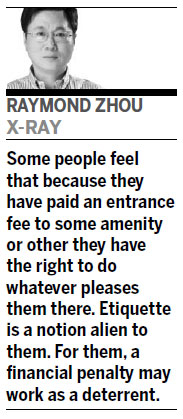The difference between decency and trashing the joint
Updated: 2014-10-11 06:51
By Raymond Zhou(China Daily)
|
|||||||||||
Some people feel that because they have paid an entrance fee to some amenity or other.
They have the right to do whatever pleases them there. Etiquette is a notion alien to them. For them, a financial penalty may work as a deterrent.
But the thing with slapping a fine is consistency, which is easier said than implemented. Very often, too many violators make it impractical to carry out the punishment in each and every case. For a while, Beijing attempted to curb jaywalking by fining violators 10 yuan. I thought it was working because I noticed jaywalkers looking twice before dashing across the road through a red light. But then the whole thing died without a trace.
For-profit businesses have a harder time implementing penalties to the letter for fear of alienating potential customers. Litterbugs are usually given a verbal warning, or more likely, a friendly reminder.
Employing trash collectors who work among tourists has the subtle effect of shaming such people into thinking twice. A decade ago I accompanied an Australian professor of tourism planning in a forest park in Yunnan province. He started picking up trash as we walked along a trail. Senior managers of the park who were with him soon started doing the same.
Obviously it did not work in the Mount Taishan case. Anyone brazen enough can turn civility on its head and make the trash collector look ridiculous. He may feel all omnipotent by essentially turning the poor worker hanging at the cliff into his slave. Fortunately, citizen journalism broadcast this small incident around the country, illuminating the public to the extent some will go to justify their thick skin. In this sense this snippet of news has been a valuable lesson in the education of civilized behavior.
This kind of lesson is now taught in the nation's schools, but it was not part of the curriculum in the old days. This discrepancy can be illustrated by the following story, also from the recent holiday: A girl was accompanied by her grandmother on a visit to a local park in Wuhan. The youngster spotted some crumpled newspaper left by another visitor who had used it for seating. She took it to a garbage bin but her grandmother scolded her, saying, "You should not have done it. It was dirty."
There in broad daylight are three types of characters and the way they dispose trash: The first would throw out or leave behind things they don't want and not bother with proper disposal; the second, which may be the majority, would not litter but turn a blind eye to trash left by others; and the third would take the trouble to put it where it belongs.
Related Stories
Selfies and the art of staying within limits 2014-08-30 10:37
Education and the purpose of philanthropy 2014-08-02 07:43
An uncomfortable new journey to the west 2014-07-25 16:15
No place for farce in charity 2014-07-19 08:53
Ring Road comes full circle 2014-07-06 06:56
Today's Top News
High-speed rail part of deals worth $10b
'Minimum force' to remove protest road barriers in Hong Kong
Spain's Catalonia to call off independence referendum
Alibaba set to expand 'double 11'
Premier Li in Russia to boost trade ties
China's exports jump 15.3%
IMF risks irrelevance without change, experts say
China bites into US carp problem
Hot Topics
Lunar probe , China growth forecasts, Emission rules get tougher, China seen through 'colored lens', International board,
Editor's Picks

|

|

|

|

|

|






